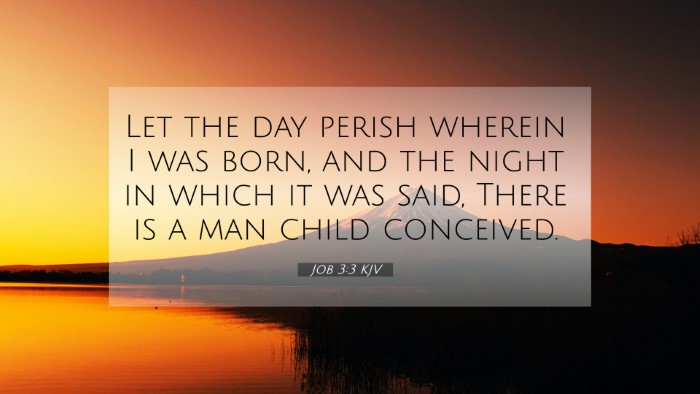Old Testament
Genesis Exodus Leviticus Numbers Deuteronomy Joshua Judges Ruth 1 Samuel 2 Samuel 1 Kings 2 Kings 1 Chronicles 2 Chronicles Ezra Nehemiah Esther Job Psalms Proverbs Ecclesiastes Song of Solomon Isaiah Jeremiah Lamentations Ezekiel Daniel Hosea Joel Amos Obadiah Jonah Micah Nahum Habakkuk Zephaniah Haggai Zechariah MalachiJob 3:3 Similar Verses
Job 3:3 Cross References
Let the day perish wherein I was born, and the night in which it was said, There is a man child conceived.
Uncover the Rich Themes and Topics of This Bible Verse
Listed below are the Bible themes associated with Job 3:3. We invite you to explore each theme to gain deeper insights into the Scriptures.
Job 3:3 Cross Reference Verses
This section features a detailed cross-reference designed to enrich your understanding of the Scriptures. Below, you will find carefully selected verses that echo the themes and teachings related to Job 3:3 KJV. Click on any image to explore detailed analyses of related Bible verses and uncover deeper theological insights.

Job 10:18 (KJV) »
Wherefore then hast thou brought me forth out of the womb? Oh that I had given up the ghost, and no eye had seen me!

Jeremiah 20:14 (KJV) »
Cursed be the day wherein I was born: let not the day wherein my mother bare me be blessed.

Jeremiah 15:10 (KJV) »
Woe is me, my mother, that thou hast borne me a man of strife and a man of contention to the whole earth! I have neither lent on usury, nor men have lent to me on usury; yet every one of them doth curse me.
Job 3:3 Verse Analysis and Similar Verses
Understanding Job 3:3
Verse: Job 3:3 - "Let the day perish wherein I was born, and the night in which it was said, There is a man child conceived."
This verse is a profound expression of Job's despair after the catastrophic losses he has endured. In this moment, he wishes that the day of his birth had never happened, reflecting the depths of his sorrow.
Overview of Job's Lament
Job's lamentation reveals the raw anguish of a man who has experienced unimaginable grief. Traditional interpretations suggest that this moment of wishing for non-existence illustrates a state of mind wrought by suffering.
Commentaries on Job 3:3
- Matthew Henry:
Henry highlights the intensity of Job's feelings, noting how extreme suffering can lead one to wish for the end of life itself. He explains that Job's desire to curse the day of his birth is a poignant demonstration of his mental and emotional state.
- Albert Barnes:
Barnes elaborates on the phrase "let the day perish," emphasizing the poetic nature of Job's lament. He explains that Job views his birth as the beginning of his troubles and wishes to erase it as if he had never existed.
- Adam Clarke:
Clarke offers insight into the cultural context of Job's time, indicating that in ancient belief systems, the day of one’s birth held significant meaning. His perspective reinforces that Job's expression is not just personal sorrow but also a deeper existential and theological crisis.
Thematic Analysis
This lamentation can be examined for its themes of despair, the human condition, and the questioning of divine providence. Job's reflections raise questions about suffering, existence, and the nature of God, making it ripe for cross-referencing within the Scriptures.
Cross-References to Job 3:3
In exploring the connections between Bible verses, several scriptures resonate with the themes presented in Job 3:3. Here are some notable cross-references:
- Psalm 51:5 - "Behold, I was shapen in iniquity; and in sin did my mother conceive me." This verse reflects on the idea of existence from the very beginning.
- Jeremiah 20:14 - "Cursed be the day wherein I was born: let not the day wherein my mother bare me be blessed." Here, Jeremiah voices a similar frustration with his birth due to the grief he bears.
- Ecclesiastes 6:3 - "If a man beget a hundred children, and live many years, so that the days of his years be many, and his soul be not filled with good... I say that an untimely birth is better than he." This verse considers the complexities of life and death.
- Job 10:18-19 - "Wherefore then hast thou brought me forth out of the womb? Oh that I had never been born..." Job continues this theme of questioning his existence.
- 1 Corinthians 15:24-26 - "Then cometh the end, when he shall have delivered up the kingdom to God..." This addresses the ultimate resolution of sorrow and death.
- Acts 17:26 - "And hath made of one blood all nations of men for to dwell on all the face of the earth..." Here, it speaks to the creation and existence of mankind.
- Luke 1:44 - "For, lo, as soon as the voice of thy salutation sounded in mine ears, the babe leaped in my womb for joy." This highlights the significance of life and conception.
Interpretive Notes and Psychological Insights
The psychological perspective on Job’s lament can offer a deeper understanding of the grief process. Job expresses a feeling of hopelessness that many experience in dark moments.
Tools for Bible Cross-Referencing
To delve deeper into such connections, tools such as a Bible concordance or a cross-reference Bible study guide can be invaluable resources for readers seeking to understand the interconnections between scripture.
Methodologies for Cross-Referencing
How to use Bible cross-references:
- Start with a verse of interest and use a cross-reference guide to find related scriptures.
- Look for thematic connections by identifying key concepts, such as suffering and lamentation.
- Engage in comparative studies to evaluate how different biblical authors approached similar themes.
- Utilize various translations to grasp the nuance of the text.
Conclusion
In conclusion, Job 3:3 serves as a powerful intersection of human suffering, existential reflection, and theological questioning. By exploring its meaning through the lenses of various commentaries and cross-references, we gain richer insights into the profound themes of life, grief, and the quest for understanding in the face of adversity.


